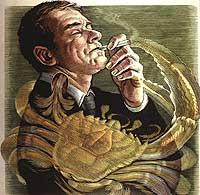Cancer. Current situation of oncology
Cancer is a disease of a malignant nature. Cancer is a tumor. And the tumor is a Latin word meaning inflammation. The cyst, or boil, cannot be considered a tumor, or a blood spill that builds up under the skin or muscle tissue. By tumor, the set of cells that are fragmented and reproduced excessively and autonomously within a tissue is usually considered.
All tissues of the body can be the origin of tumors, regardless of their location in any organ. And depending on where they are placed or the tissue from which they come, they receive different names: lipomas, sarcomas, osteomas, myomas, neuromas, etc. Chancellor are those that come from epithelial tissues, strictly speaking, such as the mouth, esophagus, stomach, prostate, breast, cervix and other epithelial tissues.

And where does this word chancellor come from? From the Greek KANKREI, which means KARRAMARRO. And why that denomination? Because the tumor tissue adheres firmly to the surrounding tissues, or because the blood and lymph vessels around the tumor resemble the crab's legs.
Tumors can be benign or malignant. In the first, the cells reproduce quickly, without altering their shape or the function of the enzymes they produce. Their cells do not invade nearby tissues or disperse through the body. However, malignant tumors are formed by atypical cells. These cells are immature, grow very fast, and invade adjacent tissues without respecting their limits. Many times the cancer cells are dispersed through the lymph vessels or blood vessels to other tissues, where metastases, h.d. creating new cancers.
This distinction is not always so clear. Unfortunately, in some cases, a tumor passes from being benign to being malignant, or can have very negative consequences for the place where it is found, even if it is benign (brain, e.g. ). On the other hand, malignant tumors present in some cases a slow and slow growth, in which the patient can live many years.
Cancer can appear in all tissues and organs, being the most affected stomach, intestine, lung, breast, uterus, prostate and mouth. Each type of cancer has its own signs, which can give us a feeling of tumor, so it is convenient to perceive them and detect them as soon as possible. So, if you get a quick diagnosis, the cancer will have a short evolution time and we can work before the cancer cell invades other tissues.
For all this it is convenient to improve health education. In this sense, campaigns of systematic exploration that are carried out in different types of cancer, such as gynecological exploration and breast study, which are performed for the early diagnosis of cervical and breast cancer from a certain age, can serve as a help for diagnosis.
As for treatment, we can say that with current knowledge, when applied correctly, one third of existing cancers can be avoided, another third can be cured, and in most incurable cancers there are ways to eliminate and relieve pain.
There are currently three fundamental resources in the treatment of cancer: surgery, radiation therapy, and chemotherapy, which in many cases should be combined. In some cases, once surgery is done, it may be convenient to continue radiation therapy to remove cancer cells that have been released from the tumor during operation and spread through the blood stream through the body.
DECALOGUE AGAINST CANCERSome types of cancer can be avoided.
More types of cancer would be cured if they were detected before.
For women
|





